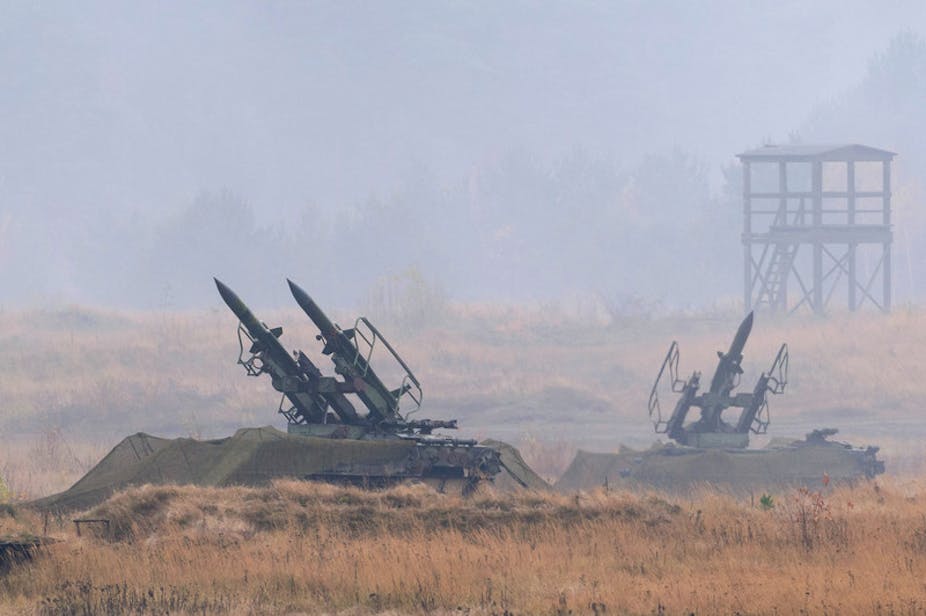On 3 April, as a direct consequence of events in Ukraine, US officials announced they would be suspending talks with Russia about NATO ballistic missile defence plans in Europe. They also warned that further ballistic missile defence assets may be deployed to the region in the near future.
While this appears to have played well politically, not least with those calling for a tougher line against Russia, it makes little sense militarily, diplomatically or strategically. It seems likely to prove counterproductive and inimical to western interests.
While both sides have an interest in reaching some sort of agreement, NATO and the West need Russian acquiescence more than Russia needs limitations on missile deployment. As a result, it seems that political expediency has trumped strategic planning.
First and foremost, the European system was designed specifically to provide protection against limited missile threats that might emerge in the future from the Middle East (read: Iran). It is simply not built to oppose Russia’s far larger and far more sophisticated strategic rocket forces. The location, quantity and capability of the current and proposed system mean it will be largely useless against any missiles launched from Russia, or for that matter against any other potential threat of Russian aggression.
Nevertheless, the deployment of the system continues to be of concern to Moscow. That concern stems primarily from the fraught politics of the present, but it also reflects worries about the future; despite continued assurances to the contrary, Russian officials suspect that the system may ultimately be aimed at them. Suspending talks on the future of the system and threatening to deploy more missiles will do little to dispel those fears.
The US and NATO have long been at pains to convince Moscow that deployments in Europe are not ultimately aimed at Russia, making this new move even more unwise. Indeed, talks conducted in recent years have largely focused on figuring out how the two groups can cooperate on such a system together.
Misfire
By using ballistic missile defences to demonstrate displeasure with Russian actions in Ukraine, the West has sent a strong signal that the two issues are linked. But because the system has been designed to combat a totally different threat, Moscow is well aware it will offer virtually no protection to NATO members in Eastern Europe who fear future Russian aggression. As a result, while future deployments to this region may demonstrate some political resolve, this is really all they can offer.
It is very difficult to see any real long-term benefit from linking missile defence policy to the Ukrainian crisis, and any short-term political benefits are likely to be outweighed by the longer term strategic problems they will cause. Negotiations and strategic stability in Europe matter more to the US and NATO than they do to Russia, and continued dialogue and perhaps some type of agreement on ballistic missile defences are fundamental to the upcoming Euro-Atlantic security agenda.
For example, it is very hard to see how any future nuclear reductions can be agreed without some type of understanding – or at least discussion – over the role of missile defences. It is equally hard to see how ongoing problems in Syria and with Iran can be addressed without Russian help. This means that the West will probably be forced to reengage Russia on the issue at some point in the near future. However, the damage will already have been done, and they are likely to find the Russians even less likely to cooperate than before.
Conflating ballistic missiles and the Ukraine crisis links three very different strategic objectives (namely Iran, the balance with Russia, and NATO coherence) and makes relatively little sense in US-Russian relations, NATO strategy or for Baltic/Eastern European security. Ultimately, this is a maladroit way to counter Russia’s posturing and adventurism, however alarming the present situation may be. All it will achieve is to make Moscow far more defensive and suspicious of western intentions, and far less inclined to cooperate on future security matters.
While it is not clear exactly how the West should respond to recent events in Crimea, using ballistic missile defences as a short-term political tool to punish Russia will be disastrous for long-term strategy, and will have little positive strategic benefit for NATO members in Europe – or for Euro-Atlantic security cooperation in general.

